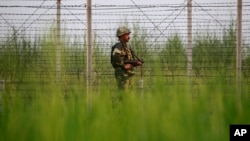Recent contacts made by the national security advisors of Pakistan and India should help de-escalate tensions between the nuclear-armed rivals over the disputed Himalayan region of Kashmir, a prominent Pakistani politician said Tuesday.
Mushahid Hussain, chairman of the Pakistani Senate’s Defense Committee and a special envoy of Pakistani Prime Minister Nawaz Sharif, said the prime minister's advisor Sartaj Aziz has made contact with his Indian counterpart "in the last 48 hours" after India turned down repeated Pakistani proposals of regional and international mediation.
“Instead of talking at each other, we’re now talking to each other,” Hussain said, speaking at event sponsored by the Pakistan American League at the International Republican Institute, a Washington-based advocacy organization.
He called the contacts "a step forward" in easing tensions between India and Pakistan.
“I feel there is a lot of room for cautious optimism," Hussain said. "I hope better sense prevails because both Pakistan and India are nuclear powers."
The Pakistani senator along with a member of Pakistan’s National Assembly, Shezra Kharal, is visiting Washington and other world capitals as part of a Pakistani diplomatic and PR offensive aimed at countering India's version of the latest flare-up in Kashmir.
Tensions between India and Pakistan escalated last week after India said its elite troops had crossed an old cease-fire boundary in the region to carry out “surgical strikes” against terrorist targets in Pakistani-controlled Kashmir.
Pakistan has dismissed the claim as Indian propaganda, saying an exchange of fire across the so-called Line of Control killed two Pakistani soldiers and injured several others.
Pakistan says India's claim of a bold military operation deep into Pakistan-controlled territory was meant for consumption by a roused up domestic audience demanding retaliation against a September 18 militant attack on an army base in Indian-ruled Kashmir that killed 18 Indian soldiers. India has long accused Pakistan of arming and sheltering the militants.
Indian Prime Minister Narendra Modi "took the hype to such a level that he had to say, ‘We’ve done something,’” Hussain said.
Kashmir is seeing its largest protests against Indian rule in recent years, triggered by the July 8 killing of a popular rebel commander by Indian soldiers.
Hussain said “India wishes to divert attention from the uprising and scapegoat Pakistan” and accused India of “human rights violations."
“At the immediate level, steps should be taken to alleviate the suffering of the Kashmiri people,” he said.




